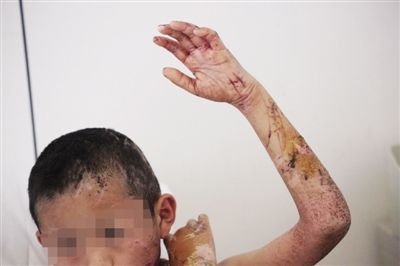Child abuse in a culture of non-interference
- By Guo Jiali
 0 Comment(s)
0 Comment(s) Print
Print E-mail China.org.cn, June 7, 2012
E-mail China.org.cn, June 7, 2012
|
|
|
Zhengyin (pseudonym), 11, with over a hundred knife wounds around his head and hands[file photo] |
On the eve of the International Children’s Day on June 1, three cases of filicide and severe child abuse came into the national spotlight.
May 26, a mother was suspected in the death of her two daughters, aged 2 and 6, found in their home in Beijing’s Fengtai District.
May 29, an 8-year-old boy in Duchang City, Jiangxi Province, was severely injured by his mother with a kitchen knife. The knife wounds required 800 stitches.
May 31, a Guangdong Province mother was found guilty of beating her 3-year-old son to death.
Hidden tragedies
The treatment and education of children is considered a family affair, and outsiders seldom inform the police when they see parents beating their children. Therefore, authorities find it difficult both to discover child abuse instances and to intervene in them.
One night in April, Zhengyin (pseudonym), 11, and his 13-year-old brother was sleeping when their mother came with a knife and began slashing at them in their beds.
Zhengyin survived, with over a hundred knife wounds around his head and hands and lasting mental trauma. His brother had not been as fortunate, who died from excessive loss of blood.
The father, Zhu Jiawen, said he would take the blame and that he regretted not being aware of the danger sooner. He said he knew his wife always beat their children for being naughty, but he thought it was normal until the day of the tragedy.
Seeing tragedies occur one after another, the public wonders if there is anything it can do to protect children from parental violence.
“The embarrassing situation is that, only when the victim is badly hurt or killed could the perpetrator of the violence be criminally prosecuted,” said Tong Lihua, director of a Beijing-based child protection advocacy group. “Right now, we lack a mechanism for protecting children from violence by their parents.”
Who is suffering beating?
In a recent survey with 200 students between the third and the six grades in a migrant school in Beijing, only one child responded with having “never been beaten.” Meanwhile, 13 children responded that they “always suffer beatings, sometimes even by clubs and belts.”
In another survey conducted in a public school with 60 children, more than a quarter chose the “never been beaten” option, while two said they “always suffer beatings.”
Tong and her colleagues compiled a report in 2011, based on the statistics from their survey of 338 cases of parental violence against children within a six-year period.
According to their report, 53 percent of the cases happened in families which have undergone divorce or relocation. Children adrift with migrant parents or those left behind by them and children living with single-parent or foster families are much more likely to suffer from abuse.
Sparing the rod spoils the child?
Many parents who beat their children believe in the notion of “spare the rod, spoil the child.” Therefore, they use physical punishment on their children in instances such as them not behaving well in school, failing in exams or even making noise while eating.
Jiajia (pseudonym), 12, is a student in a migrant school who is being helped at the Beijing Maple Psychological Consulting Center.
At home, Jiajia and her two siblings suffer a lot of beating from their mother, who considers beating them her given right as a parent and the best way to educate children.
However, many experts say physical punishment is counterproductive in teaching children good behavior.
Hou Zhiming, head of the anti-domestic violence project in Beijing Maple Psychological Consulting Center, said: “We found that all the badly-behaved students are those often beaten by their parents. They often skip school, get in fights or become shut-ins.” The project has conducted surveys with more than 1,000 students in over 10 migrant schools within five years.
“If children cannot trust their parents, who else can they trust?” Hou said violence by a parent would cause children severe psychological trauma.
Children inherit parents’ violent behavior
Wang Ji (pseudonym), a 12 years old student in a migrant school, was always beaten by his father, and transferred schools three times in six years for the same reason: fighting with classmates.
“If my classmate looks at my wounds caused by my father, I would beat him,” Wang Ji said quietly. “There was one time I beat my classmate so badly that blood ran all over his lower jaw and neck.”
Zhang Jiang (pseudonym), who has suffered a lot of beating by his father and step-mother during childhood, is now 17 and proudly announced: “My father dares not to beat me anymore, for I just threw him to bed so easily when he tried to beat me last time.”
This is what Hou worries most. Children who had grown up in a family filled with violence would inherit and conduct violence themselves. “Children who often suffer beatings will wrongly assume that violence is a right way to solve problems,” he said.







Go to Forum >>0 Comment(s)